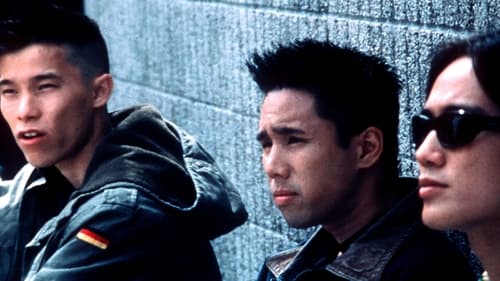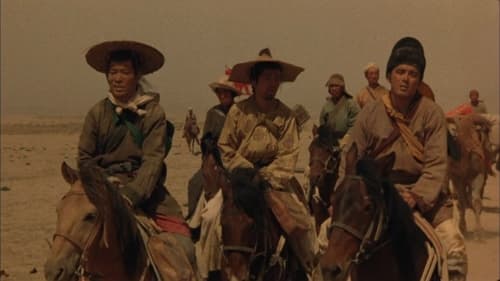
Editor
On February 4, 1974, the Symbionese Liberation Army kidnapped newspaper heiress Patricia Hearst. A month later, SLA members and Hearst robbed a bank in San Francisco. After the telecast shootout with police in Los Angeles, two remaining SLA members and Hearst fled to rural Pennsylvania, where they met Wendy Yoshimura. Wendy was eluding authorities who had indicted her on weapons and explosives charges in 1972. After 3 years on the run, Wendy was captured with Hearst in a San Francisco apartment, where the FBI threatened to "blow Wendy's head off". She was kept in isolation for 40 days, then jailed for 3 months until the Wendy Yoshimura Fair Trial Committee came to her aid.

Cinematography
On February 4, 1974, the Symbionese Liberation Army kidnapped newspaper heiress Patricia Hearst. A month later, SLA members and Hearst robbed a bank in San Francisco. After the telecast shootout with police in Los Angeles, two remaining SLA members and Hearst fled to rural Pennsylvania, where they met Wendy Yoshimura. Wendy was eluding authorities who had indicted her on weapons and explosives charges in 1972. After 3 years on the run, Wendy was captured with Hearst in a San Francisco apartment, where the FBI threatened to "blow Wendy's head off". She was kept in isolation for 40 days, then jailed for 3 months until the Wendy Yoshimura Fair Trial Committee came to her aid.

Director
On February 4, 1974, the Symbionese Liberation Army kidnapped newspaper heiress Patricia Hearst. A month later, SLA members and Hearst robbed a bank in San Francisco. After the telecast shootout with police in Los Angeles, two remaining SLA members and Hearst fled to rural Pennsylvania, where they met Wendy Yoshimura. Wendy was eluding authorities who had indicted her on weapons and explosives charges in 1972. After 3 years on the run, Wendy was captured with Hearst in a San Francisco apartment, where the FBI threatened to "blow Wendy's head off". She was kept in isolation for 40 days, then jailed for 3 months until the Wendy Yoshimura Fair Trial Committee came to her aid.

Director
This insightful documentary explores the life of Frank Chin, the godfather of modern Asian Americanism. Taking a look at his own story and the many controversies raging over him during the past thirty years, the film reveals the much larger implications of the literary, ideological and cultural changes taking place in Asian America.

Sound
A group of over-achieving Asian-American high school seniors enjoy a power trip when they dip into extra-curricular criminal activities.

Additional Camera
This documentary brings to the public, for the first time, a story that was classified as secret by the US government for over four decades. Exploring the roots and legacy of the Cold War on the Chinese American community during the 1950s and the 1960s, it presents first hand accounts of seven men and women's experiences of being hunted down, jailed and targeted for deportation in America.

Sound Recordist
This documentary brings to the public, for the first time, a story that was classified as secret by the US government for over four decades. Exploring the roots and legacy of the Cold War on the Chinese American community during the 1950s and the 1960s, it presents first hand accounts of seven men and women's experiences of being hunted down, jailed and targeted for deportation in America.

Production Sound Mixer
Filipino-American high school student Ben (Dante Basco) works in a comic book shop to earn money to pay his way into Cal Arts. His father, a postman, is determined that his son--who has won a pre-med scholarship to UCLA--will become a doctor. The eighteenth birthday party of Ben's sister, Rose, sets off a comedic and touching series of events and family struggles that will in turn determine young Ben's future. This fresh independent production from Gene Cajayon presents a lighthearted and warm coming-of-age tale filtered through the eyes of an American subculture rarely seen on film.

Sound Recordist
From Academy Award-winning filmmaker Freida Lee Mock, ‘Bird by Bird with Annie’ offers an intimate portrait of a writer and her craft, interweaving the story of Anne Lamott's life—in itself a deeply moving tale of addiction and redemption, grief and joy, intellect and faith—with a year's worth of interviews, public lectures, and footage of the writer at work, focusing particularly on Lamott's candid, humorous, and disarmingly straightforward advice on the struggles and joys of writing. The author's reassurance and guidance concerning the process of writing—which has little resemblance to its glorified image—becomes a stirring call to action celebrating the potential of each individual, the silencing of our inner critics, and the courage to create something honest and meaningful. Poignant and inspirational, ‘Bird by Bird with Annie’ takes us deep into Anne Lamott's intoxicatingly brave world, one in which writing is a means of finding out who we are, how we live, and why we're here.

Sound Mixer
移民として故郷の中国から苦難の人生を背負って生き抜いてきた4人の母親と、アメリカ人として生まれ育った4人の娘たちの世代間の相違と心の絆を描いた群像劇。エイミー・タンの同名ベストセラー小説を、「夜明けのスローボート」の女性監督ウェイン・ワンが映画化。
ロサンゼルス。聡明なスーユアン、リーダー格のリンド、芯の強いアンメイ、気品あるインインの同世代の4人の女性は、マージャン卓を囲んで食事をしたりおしゃべりをしたりする会″ジョイ・ラック・クラブ″を作っていた。アメリカに移住して30年、2ケ月前に他界した母スーユアンの代わりに会合に出席したジューンは、故国に残してきた双子の姉の存在が、母の死に際し語られる。居ても立っても居られぬジェーンは、まだ見ぬ姉たちを訪ねる……。

Sound
A highly critical documentary about the history of Asian-American actresses in Hollywood. Features interviews with pioneering Asian-American actresses and clips from classic films such as "The Thief of Bagdad", "The Good Earth", and "The World of Suzie Wong", interspersed with Asian/feminist sociological commentary.

Sound Recordist
11世紀、中国・宋の時代。科挙に落ち続ける若者・趙行徳は新興国・西夏に希望を求めてシルクロードの旅に立つが、その途中で西夏の漢人部隊と出会い、隊長の朱王礼の下に就くことに。やがて部隊はウィグル王女ツルピアを捕虜として連れてきたが、行徳とツルピアは恋に落ちてしまう。

Director
The Fall of the I-Hotel brings to life the battle for housing in San Francisco. The brutal eviction of the International Hotel's tenants culminated a decade of spirited resistance to the razing of Manilatown. The Fall of the I-Hotel works on several levels. It not only documents the struggle to save the I-Hotel, but also gives an overview of Filipino American history.

Sound Mixer
Two cabbies search San Francisco's Chinatown for a mysterious character who has disappeared with their $4000. Their quest leads them on a humorous, if mundane, journey which illuminates the many problems experienced by Chinese-Americans trying to assimilate into contemporary American society.

Editor
WHO WE ARE forms the unifying theme of "Dupont Guy". It affirms the legitimacy of Chinese-American (nee Chonk) culture, exploring cross cultural currents of San Francisco's Chinatown: assimilation, self-contempt, schizophrenic language, duplicitous behavior.

Cinematography
WHO WE ARE forms the unifying theme of "Dupont Guy". It affirms the legitimacy of Chinese-American (nee Chonk) culture, exploring cross cultural currents of San Francisco's Chinatown: assimilation, self-contempt, schizophrenic language, duplicitous behavior.

Producer
WHO WE ARE forms the unifying theme of "Dupont Guy". It affirms the legitimacy of Chinese-American (nee Chonk) culture, exploring cross cultural currents of San Francisco's Chinatown: assimilation, self-contempt, schizophrenic language, duplicitous behavior.

Writer
WHO WE ARE forms the unifying theme of "Dupont Guy". It affirms the legitimacy of Chinese-American (nee Chonk) culture, exploring cross cultural currents of San Francisco's Chinatown: assimilation, self-contempt, schizophrenic language, duplicitous behavior.

Director
WHO WE ARE forms the unifying theme of "Dupont Guy". It affirms the legitimacy of Chinese-American (nee Chonk) culture, exploring cross cultural currents of San Francisco's Chinatown: assimilation, self-contempt, schizophrenic language, duplicitous behavior.

















